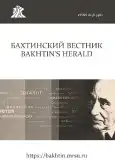Vol 6, No 1 (2024)
- Year: 2024
- Published: 27.09.2024
- Articles: 8
- URL: https://bakhtiniada.ru/2658-5480/issue/view/16749
Full Issue
Theoretical research
The answer to question: Where did Bakhtin come from?
Abstract
In this article the old question in Bakhtin studies: “Where did Bakhtin come from?” is analyzed against the systematic-historical background. The question is being approached with the concept of the “paradigm shift”, this time not on the sphere of natural sciences (as in T. Kuhn’s book about scientific revolution), but in the sphere of philosophy and the human studies, i. e. epistemology in the humanities. The new European revolution in the fields of historical experience, during the First World War and after it (the so- called “one hundred’s decade”), seems to have been the historical “chronotope” of M. Bakhtin’s own specific turn in philosophy, primarily in ontology; this is the context, I believe, the Russian thinker actually “came from” as a philosopher. In this sense, Bakhtin might be seen and thought as “the only one among the many”, as Sergey Averintsev once called him. From this point of view, the young Bakhtin’s project of the paradigm shift in prima philosophia, his text Toward a Philosophy of the Act (1921/22) is looked upon as a specifically individual and nationally unique variation of what M. Theunissen much later called, in his monumental book Der Andere, “social ontology” as the modern (existential) form of the first philosophy. In this sense, Bakhtin, as well as his Western contemporaries put to question the “fatal theoreticism” of the philosophy of the New Times, taking what he called participative thinking as an opposition not to theory, but to “theoroticism”.
 4-17
4-17


On the chronological coordinates of the world art process
Abstract
The article examines the general coordinates of the retrospective of world artistic culture and identifies the patterns of its evolution, which make it possible to predict subsequent development. This is due to the fact that until now quite a lot in our vision of the general panorama of the artistic-historical process remains approximate and unclear. The author offers four positions of chronological division: epoch, epoch, period and stage. The article examines a specific period of historical time, within which the phenomena of one or another type of art or even all its types are endowed with a certain commonality, a set of distinctive features, which allows us to talk about the unity of the ethical and aesthetic. views, about the similarity of artistic manners and techniques.
 18-32
18-32


Human corporeality as a subject of humanitarian knowledge
Abstract
The article examines the theoretical discourse of physicality as the quintessence of philosophical, spiritual, intellectual quests, teachings, and concepts. It is shown how each scientific tradition (philosophical, anthropological, psychological, sociological, cultural, artistic), studying the phenomenon of corporeality from different angles, reinterpreted, supplemented or denied the previous one. In this context corporality appears as a source of meaning, as a sign system, and also as a field for experiment in art.
 33-37
33-37


Dialogs
“The Sun of Russian Poetry” and European Literature: to the 225th anniversary of the birth of A.S. Pushkin
Abstract
The study examines the influence of the classics of European literature (W. Shakespeare, J.G. Byron, E.T.A. Hoffmann) on the work of A.S. Pushkin. It is shown that the Russian classic does not simply borrows motifs and images of world literature, but “embeds” them into the Russian cultural context, enriches them with national coloring and characteristic features of domestic culture. A.S. Pushkin establishes a dialogue between Russian and European literature, turns the “foreign” word into his own one, makes Russian literature a part of the world cultural heritage.
 38-40
38-40


From archives
M.M. Bakhtin’s lectures on the history of foreign literature recorded by M.A. Beban. Part 9
Abstract
The publication represents the final part of M.M. Bakhtin’s lectures read at the Mordovia State Pedagogical Institute (now N.P. Ogarev Mordovia State University) in the second semester of the 1936/37 academic year and recorded by a Moksha-Mordovian writer, one of the founders of professional Mordovian literature, at that time a student of the literary faculty M.A. Beban (Byabin). The fragment examines the history of English and French literature of the 17th century. It briefly analyzes the work of English authors J. Milton, J. Bunyan, considers the theoretical foundations of French classicism (the aesthetics of N. Boileau, the philosophy of R. Descartes), characterizes the work of French writers – representatives of classicism (F. de Malherbe, P. Corneille, J. Racine, Molière).
 41-59
41-59


Reviews, scientific chronicles
The problems of Bakhtin’s heritage on the pages of «Literaturovedcheskij zhurnal» of recent years
Abstract
The review article presents an analysis of materials devoted to the personality and scientific heritage of M.M. Bakhtin published in the «Literaturovedcheskij zhurnal». As the authors point out, from 2021 to 2024, the journal has become one of the most important platforms for discussing topical issues of contemporary Bakhtin studies (various aspects of the thinker’s scientific biography, his key ideas, the nature of their reception, etc.). It is noted that among the authors of the journal are major representatives of Russian and foreign Bakhtin studies (V.L. Makhlin, N.I. Nikolaev, V.I. Tyupa, K. Emerson, K. Brandist). Special attention is paid to I.V. Peshkov’s cycle of publications devoted to the “Bakhtin question”, i.e. the authorship of books and articles published in the second half of the 1920s under the names of V.N. Voloshinov, I.I. Kanaev, P.N. Medvedev.
 60-72
60-72


A new book on M.M. Bakhtin by an Indian literary scholar
Abstract
E.V. Ramakrishnan's book "Mikhail Bakhtin. A Critical Introduction" (2023) is seen as the beginning of a new phase of Indian Bakhtin Studies. The Indian researcher focuses on the philosophical and literary heritage of the Russian thinker. The authors of the article show that the Bakhtinian idea of responsibility, the theory of polyphonic novel, the concept of carnival and folk laughter are particularly significant for Ramakrishnan.
 73-76
73-76


Chronicle
 77-84
77-84











